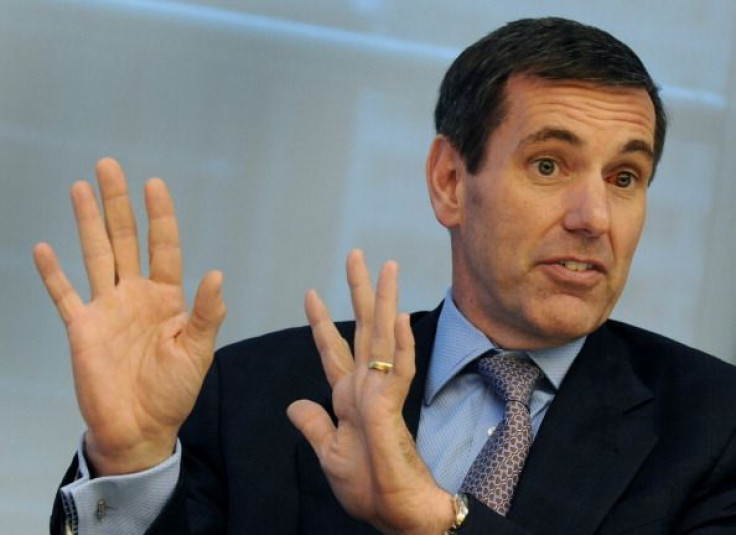As Humana Links Bonuses To Health Of Customers, Insurer May Actually Be Protecting Executive Pay

Health insurer Humana is running an experiment. What if, instead of tying its executives' bonus payments solely to the company's earnings, Humana also linked those payouts to the health of the very constituents the insurer nominally serves?
The Louisville-based for-profit insurer said it tested out that model for 2015, by tying 80 percent of an executive's cash incentive to the company's earnings and 20 percent to consumer health metrics, according to a recent filing with the Securities and Exchange Commission. The idea is viewed as innovative among health insurers, but some experts suggest that the new model is in fact a subtle way of protecting executive pay, especially while insurers incur losses on insurance plans sold through marketplaces created by the Affordable Care Act.
“Diversify is a really great way to put it,” said Dan Marcec, director of content at Equilar, a company based in Redwood City, California, that collects information on executive compensation. “Considering the challenging environment brought on by the new rules and regulations, [health insurers] want to be sure that executives are incentivized, even if the profits are not there.”
Humana's move, while novel among health insurers, mirrors shifts in executive pay more broadly. "Generally, the idea of tying bonuses to a nonfinancial goal is consistent with a trend we’ve seen across all industries," Marcec said. Some companies are now basing bonuses on successes in areas such as innovation or managing employees. "Companies want to show to their investors that executive pay is based on performance in a variety of ways, not just earnings and stock price," Marcec added.
In the fourth quarter of 2015, Humana's net income fell 30 percent compared to the year before, from $145 million to $101 million. The company blamed these declines on plans sold on Affordable Care Act exchanges, which it said attracted sicker and therefore more expensive patients.
As a result, not only did Humana declare it was reconsidering selling plans on those exchanges in 2017, but its executives did not take home any bonuses, although CEO Bruce Broussard's total compensation for the year still amounted to $10.3 million.
The 20 percent of executive bonuses tied to health metrics were based on customers' participation in five different company health programs including several different health assessments and Humana's Vitality program, which promises to reward members with gift cards and other incentives for leading healthy lifestyles.
The goal was to “incentivize our executives to take actions to improve the health of our members,” the company said in its SEC filing, which also described the programs to which bonuses were connected as "proven to improve health outcomes and lower the cost of care." The company would calculate the success of each of those five programs and combine them into a single overall score. If they beat scores from 2014, then a proportionate bonus would be awarded.
A spokesperson for Humana did not respond to a question about whether the company would continue with the same bonus model in 2016.
Jim Hatch, president of the New York-based advisory firm Hatch & Associates, was doubtful that linking executive bonuses would have any impact on members' health.
For Humana's CEO, the bonus constitutes 15 percent of total compensation. If only 20 percent of the bonus is tied to health metrics, then just 3 percent of the CEO's entire compensation package would linked to health outcomes, noted Hatch, who reviewed the Humana SEC filing. By the same token, for other Humana executives, roughly 4 percent of their total compensation was ultimately tied to health — numbers Hatch suggested were relatively insignificant.
"These executives are making millions of dollars, and you're going to take 3 percent of their compensation and put it at risk based on a metric to improve health?" Hatch said. "Is that something they're going to notice everyday? Probably not."
But in an environment of scrutiny and criticism of excessive executive salaries and bonuses — presidential candidates regularly disparage outsized compensation — revising corporate executive pay structures may also be an attempt to cleaning up public perceptions, experts said. Humana described its bonuses changes as being “culturally important.”
In 2014, executives at healthcare companies in the United States had the highest median CEO pay of all industries, taking home $13.6 million that year, analysis by the Associated Press/Equilar has shown. Critics slam outsized paychecks as driving up the costs of healthcare — the $3 trillion the U.S. spends on healthcare amounts to a fifth of the economy — even as companies argue that such compensation is necessary to motivate leaders.
Tying executive pay to the health of an insurance company's customers was laudable as a theory, Hatch said. But he nevertheless found it difficult to envision this model as having much of a practical impact, unless the company significantly increased the proportion of the pay tied to health metrics.
"It's a nice step, and they should do it," Hatch said. "But it's not a serious effort," he added. "Three to 4 percent of an executive making millions of dollars in pay: Is that really going to move the needle?"
© Copyright IBTimes 2024. All rights reserved.












